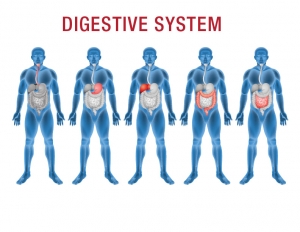In our last Health Science News Page, we discussed the body’s requirements for fiber and presented dietary sources. Although dietary fiber is not defined as a nutrient, and the body does not digest or absorb it, dietary fiber has a critical role in the prevention of diseases and maintaining health.
“You are what you eat” is a common phrase, however, a more accurate statement is “You are what you digest.” This is because dietary nutrients will not be available for the body if they are not optimally digested and absorbed through the digestive tract. A poorly functioning digestive system leads to inadequate nutrient absorption/malnourishment and the development of various health issues such as seasonal allergies, acid reflux, autoimmune conditions like Crohn’s disease, and irritable bowel disease. Our ability to fight seasonal flu or serious infections depends upon a healthy digestive tract. Just like all other systems in our body, the digestive system requires not only macronutrients (carbohydrates, proteins and fats) and micronutrients (vitamins, minerals and amino acids), but also dietary fiber.
The human digestive system is approximately 16 feet long and it is estimated that the digestive system will process more than 25 tons of food over the course of our lifetime! The function of our digestive system is to convert the foods that we eat into bioenergy for the cells to use for maintenance, growth, and repair. Although we tend to think of the digestive system in terms of organs such as the stomach, intestines, liver and pancreas, these digestive organs are made up of different types of specialized cells.


